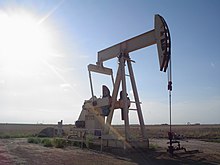As of 2008, Texas had a gross state product (GSP) of $1.224 trillion, the second highest in the U.S. Its GSP is comparable to the GDP of India or Canada which are ranked 12th and 11th worldwide. Texas's economy is the fourth largest in the world of country subdivisions behind England (as part of the UK), California and Tokyo Prefecture. Its Per Capita personal income in 2009 was $36,484, ranking 29th in the nation. Texas's large population, abundance of natural resources, and diverse population and geography have led to a large and diverse economy. Since oil was discovered, the state's economy has reflected the state of the petroleum industry. In recent times, urban centers of the state have increased in size, containing two-thirds of the population in 2005. The state's economic growth has led to urban sprawl and its associated symptoms.
As of January 2010, the states unemployment rate is 8.2%.
Texas has a "low taxes, low services" reputation. According to the Tax Foundation, Texans' state and local tax burdens rank among the lowest in the nation, 7th lowest nationally; state and local taxes cost $3,580 per capita, or 8.4% of resident incomes. Texas is one of seven states that lack a state income tax.Instead, the state collects revenue from a state sales tax, which is charged at the rate of 6.25%, but local taxing jurisdictions (cities, counties, special purpose districts, and transit authorities) may also impose sales and use tax up to 2% for a total maximum combined rate of 8.25%. Texas is a "tax donor state"; in 2005, for every dollar Texans paid to the federal government in federal income taxes, the state received approximately $0.94 in benefits.
In 2004, Site Selection Magazine ranked Texas as the most business-friendly state in the nation in part because of the state's three-billion-dollar Texas Enterprise Fund. The state shares the most Fortune 500 company headquarters along with, California, in the United States.
In 2010, there were 346,000 millionaires in the state, second highest in the nation.
Agriculture and mining
Texas has the most farms and the highest acreage in the United States. Texas leads the nation in livestock production. Cattle is the state's most valuable agricultural product, and the state leads nationally in production of sheep and goat products. Texas leads the nation in production of cotton. The state grows significant amounts of cereal crops and produce. Texas has a large commercial fishing industry. With mineral resources, Texas leads in creating cement, crushed stone, lime, salt, sand and gravel.
Energy
Ever since the discovery of oil at Spindletop, energy has been a dominant force politically and economically within the state. According to the Energy Information Administration, Texans consume the most energy in the nation per capita and as a whole. Unlike the rest of the nation, most of Texas is on its own alternating current power grid, the Texas Interconnection. Texas has a deregulated electric service.
The Railroad Commission of Texas, contrary to its name, regulates the state's oil and gas industry, gas utilities, pipeline safety, safety in the liquefied petroleum gas industry, and surface coal and uranium mining. Until the 1970s, the commission controlled the price of petroleum because of its ability to regulate Texas's oil reserves. The founders of the Organization of Petroleum Exporting Countries (OPEC) used the Texas agency as one of their models for petroleum price control.
Texas has known petroleum deposits of about 5 billion barrels (790,000,000 m3), which makes up approximately one-fourth of the known U.S. reserves. The state's refineries can process 4.6 million barrels (730,000 m3) of oil a day. The Baytown Refinery in the Houston area is the largest refinery in America. Texas also leads in natural gas production, producing one-fourth of the nation's supply. Several petroleum companies are based in Texas such as: Conoco-Phillips, Exxon-Mobil,Halliburton, Valero, and Marathon Oil.
The state is a leader in renewable energy sources; it produces the most wind power in the nation. The Roscoe Wind Farm in Roscoe, Texas, is the world's largest wind farm as of October 2009 with a 781.5 megawatt (MW) capacity. The Energy Information Administration states that the state's large agriculture and forestry industries could give Texas an enormous amount biomass for use in biofuels. The state also has the highest solar power potential for development in the nation.
Technology
With large universities systems coupled with initiatives like the Texas Enterprise Fund and the Texas Emerging Technology Fund, a wide array of different high tech industries have developed in Texas. The Austin area is nicknamed the "Silicon Hills" and the north Dallas area the "Silicon Prairie". Texas has the headquarters of many high technology companies, such as Dell, Inc., Texas Instruments, Perot Systems, AT&T and Electronic Data Systems (EDS, acquired by Hewlett-Packard, August 2008), as well as the former headquarters of Compaq Computer Corp, which exists today as the largest campus of Hewlett-Packard (headquartered in CA).
The National Aeronautics and Space Administration's Lyndon B. Johnson Space Center (NASA JSC) located in Southeast Houston, sits as the crown jewel of Texas's aeronautics industry. Fort Worth hosts both Lockheed Martin's Aeronautics division and Bell Helicopter Textron. Lockheed builds the F-16 Fighting Falcon, the largest Western fighter program, and its successor, the F-35 Lightning II in Fort Worth.
Commerce
Texas's affluence stimulates a strong commercial sector consisting of retail, wholesale, banking and insurance, and construction industries. Examples of Fortune 500 companies not based on Texas traditional industries are AT&T, Men's Warehouse, Landry's Restaurants, Kimberly-Clark, Blockbuster, Whole Foods Market, and Tenet Healthcare. Nationally, the Dallas–Fort Worth area, home to the second shopping mall in the United States, has the most shopping malls per capita of any American metropolitan area.
Mexico, the state's largest trading partner, imports a third of the state's exports because of the North American Free Trade Agreement (NAFTA). NAFTA has encouraged the formation of controversial maquiladoras on the Texas/Mexico border.





No comments:
Post a Comment